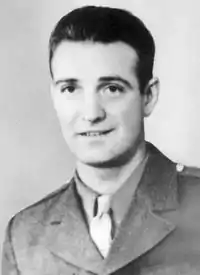John J. Pinder Jr. | |
|---|---|
 | |
| Born | June 6, 1912 McKees Rocks, Pennsylvania, US |
| Died | June 6, 1944 (aged 32) near Colleville-sur-Mer, France |
| Place of burial | Grandview Cemetery, Florence, Pennsylvania |
| Allegiance | |
| Service/ | |
| Rank | |
| Unit | 16th Infantry Regiment, 1st Infantry Division |
| Battles/wars | World War II • Normandy landings † |
| Awards | |
John J. Pinder Jr. (June 6, 1912 – June 6, 1944) was a United States Army soldier and a recipient of the United States military's highest decoration—the Medal of Honor—for his actions in World War II during the Battle of Normandy.
Biography
Pinder joined the Army from Burgettstown, Pennsylvania, and after initial training was assigned to Headquarters Company, 16th Infantry Regiment, 1st Infantry Division. In the vicinity of Gangi, Sicily, Pinder's heroic actions on July 23, 1943, earned him the Bronze Star Medal (posthumously). By June 6, 1944, was serving as a Technician Fifth Grade. On that day, he participated in the Allied landings near Colleville-sur-Mer, France. Despite being twice wounded, Pinder refused medical attention and continued to gather communications equipment in order to establish a radio link on the beach before receiving a third and fatal wound. He was posthumously awarded the Medal of Honor seven months later, on January 4, 1945.
Pinder, killed on his 32nd birthday, was buried in Grandview Cemetery, Florence, Pennsylvania. The U.S. Army barracks in Zirndorf, Germany, were named Pinder Barracks in his honor. Although these barracks were abandoned in the years after 1999, the name Pinder remained by decision of the city administration as the newly formed city district "Pinder Park".[1]
US Army Transportation Corps coastal cargo ship FS 398 was named Cpl John J. Pinder Jr. in his honor.[2]
Medal of Honor citation
Technician Pinder's official Medal of Honor citation reads:

For conspicuous gallantry and intrepidity above and beyond the call of duty on 6 June 1944, near Colleville-sur-Mer, France. On D-day, Technician 5th Grade Pinder landed on the coast 100 yards off shore under devastating enemy machinegun and artillery fire which caused severe casualties among the boatload. Carrying a vitally important radio, he struggled towards shore in waist-deep water. Only a few yards from his craft he was hit by enemy fire and was gravely wounded. Technician 5th Grade Pinder never stopped. He made shore and delivered the radio. Refusing to take cover afforded, or to accept medical attention for his wounds, Technician 5th Grade Pinder, though terribly weakened by loss of blood and in fierce pain, on 3 occasions went into the fire-swept surf to salvage communication equipment. He recovered many vital parts and equipment, including another workable radio. On the 3rd trip he was again hit, suffering machinegun bullet wounds in the legs. Still this valiant soldier would not stop for rest or medical attention. Remaining exposed to heavy enemy fire, growing steadily weaker, he aided in establishing the vital radio communication on the beach. While so engaged this dauntless soldier was hit for the third time and killed. The indomitable courage and personal bravery of Technician 5th Grade Pinder was a magnificent inspiration to the men with whom he served.
Military awards and other honors
Technician Fifth Grade John Joseph Pinder's awards include :
 | |||||||||||
| Badge | Combat Infantryman Badge | ||||||||
|---|---|---|---|---|---|---|---|---|---|
| 1st Row | Medal of Honor | Bronze Star Medal | Purple Heart | ||||||
| 2nd Row | American Campaign Medal | European-African-Middle Eastern Campaign Medal | World War II Victory Medal | ||||||
See also
References
- ↑ Pinder Park at the Nuremberg Military Community website
- ↑ "FS 398". Miramar Ship Index (subscription required). Wellington, New Zealand: R B Haworth. Retrieved 15 January 2016.
- "Medal of Honor recipients - World War II (M-S)". Medal of Honor citations. United States Army Center of Military History. June 8, 2009. Archived from the original on 2008-04-30. Retrieved 2007-11-12.